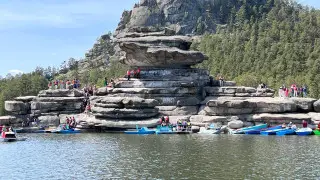Tengrinews.kz - Kazakhstani scientists have raised concerns about the growing number of tourists in natural parks like Ile-Alatau and Burabay, citing environmental issues. Rosa Temirbayeva, a senior researcher and PhD holder at the Institute of Geography and Water Security, shared findings from studies conducted between 2018-2020 and 2024.
According to Temirbayeva, this year’s monitoring revealed that recreational load limits in popular spots, such as Mount Bolektau, the Abai Khan Glade, and Imanayev Creek, were exceeded by up to nine times per hectare.
“Tourist pressure leads to slope erosion, exposed tree roots, and damage to vegetation. It’s crucial to regulate visitor numbers and implement a system to control access,” Temirbayeva explained.
The expert highlighted international practices:
- Yellowstone National Park implements visitor quotas.
- Machu Picchu in Peru requires tourists to book tickets in advance.
- Galápagos Islands periodically close certain areas for restoration.
Temirbayeva believes similar measures could help protect Burabay. She also emphasized the impact of vehicle traffic.
“Over the first 10 months of this year, 216,793 vehicles entered the park—averaging 700 cars daily, with only 250 official parking spaces available. This daily average is much higher during the summer. Unauthorized parking damages soil and pollutes the air,” she noted.
To minimize harm, Temirbayeva suggested limiting car access and promoting eco-friendly transport.
“Raising entry fees could be an effective measure. Economic tools like higher entry fees can help reduce traffic, decreasing pollution and ecosystem strain. The funds could be used to improve infrastructure and support conservation efforts. In countries like the U.S. and Norway, some parks limit car access and offer shuttle services from remote parking areas. This improves air quality and preserves ecosystems,” she proposed.
Temirbayeva also stressed the importance of fostering ecological awareness among tourists.
“In Australia, educational programs are common, while Japan uses advertising campaigns and volunteer initiatives to spread information about park rules,” she said.
She suggested measures such as fencing off natural landmarks, installing wooden paths, and providing adequate trash bins and restrooms in Burabay.
In conclusion, Temirbayeva emphasized that reducing the ecological burden requires a comprehensive approach - from planning and monitoring to educating visitors. She noted that Kazakhstan could benefit from adopting international best practices to safeguard its unique ecosystems.

